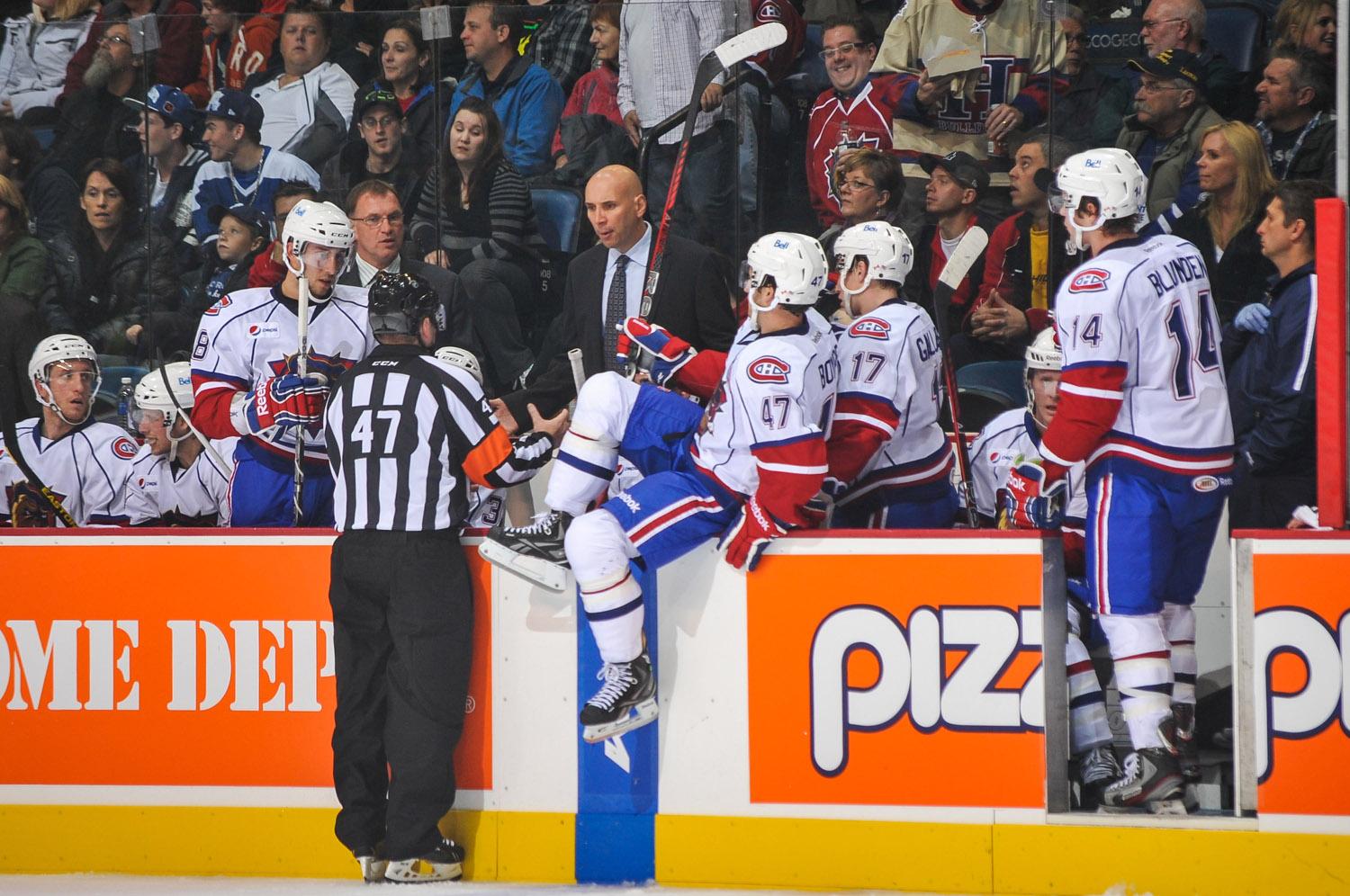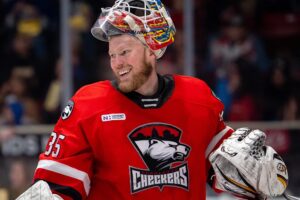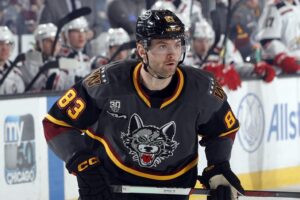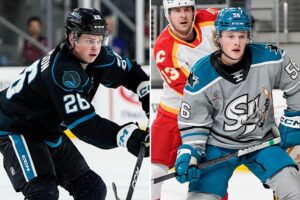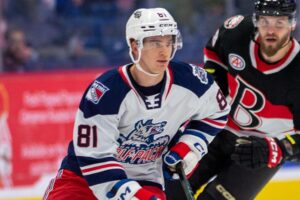By Stuart McComish || AHL On The Beat Archive
It didn’t take Sylvain Lefebvre long to figure out what he wanted to do after his career as a professional hockey player ended.
A veteran of 945 National Hockey League games with the Montreal Canadiens, Toronto Maple Leafs, Quebec Nordiques, Colorado Avalanche and New York Rangers, Lefebvre jumped right into coaching and hasn’t looked back.
After five seasons as an assistant coach in the Avalanche organization, Lefebvre is in his first season as a head coach, guiding the Hamilton Bulldogs, the Canadiens’ American Hockey League affiliate.
“When I retired I looked at different options and the best thing for a lot of former players is to stay in the game,” Lefebvre, 45, said recently. “We were passionate about the game for so many years and it’s tough to get away from it. Some players do like to get away from it, but for me coaching was a natural transition. I didn’t know if I would enjoy coaching, but I was hooked right away.”
A defenceman, Lefebvre played three seasons for Laval of the Quebec Major Junior Hockey League before signing with the Canadiens as an undrafted free agent in 1986. He spent two full seasons with the AHL’s Sherbrooke Canadiens and made his NHL debut in 1989. He went on to record 30 goals and 154 assists for 184 points and won a Stanley Cup with the Avalanche in 1996. Lefebvre, who skated in 129 NHL playoff games, retired after helping Bern win the Swiss National League championship in 2003-04.
A native of Richmond, Que., Lefebvre, a father of four, began his coaching career working with the junior team at Champlain College in Lennoxville, Que.
“I wanted to see if I would like it and enjoy it and it became a real passion for me. Even though I was only involved part time, I was around the rink more often than not. My wife and kids enjoyed it. It was part of a school program and I thought it would be good for what I believed in and what I was preaching to my kids. It gave me a chance to spend quite a bit of time on the ice with the young players at that level and I really enjoyed it.”
Lefebvre eventually moved into a part-time role as a development coach for the Avalanche where he hooked up with former NHLer Joe Sacco, who was an assistant coach with the Albany River Rats, at the time the AHL affiliate for both the Avalanche and Carolina Hurricanes.
“Colorado decided it wanted its own affiliate and they told Joe he could be the head coach and they told me I would be his assistant,” said Lefebvre. “So I knew I was going somewhere with Joe, I just didn’t know where.”
Lefebvre and Sacco resurfaced in Cleveland where the Avalanche unveiled its affiliate, the Lake Erie Monsters, for the 2007-08 season. The duo was with the Monsters for two seasons before moving to the Avalanche in 2009-10. Lefebvre spent three seasons in the NHL as an assistant to Sacco before being hired by the Canadiens to be the Bulldogs’ bench boss last June.
“I wanted to be a head coach and once I got that opportunity I jumped on it right away,” said Lefebvre. “As an assistant you are part of the supporting cast and as the head coach you want your assistants to work a certain way and do certain things. It’s my turn now to direct the traffic. It’s a little bit different now, you talk more to the group, but I still like to talk to players individually.
“Day to day you have to be the voice in the dressing room. You have to set the tone for how you want the day to go. You are the main guy, the leader of the group and when you send some information to the players you want to be as clear as possible because you want them to understand right away.”
Lefebvre is aided by an experienced group that includes assistant coaches Donald Dufresne and Ron Wilson, goaltending coach Vincent Riendeau and video coordinator Lucas Lawson. With the NHL still locked out, the Bulldogs have also been benefitting from the services of longtime NHLers Martin Lapointe and Patrice Brisebois, who serve as the Canadiens’ director of player development and player development coach, respectively.
“It’s a great supporting cast,” said Lefebvre. “Those guys are there for the players, they are there for their development. They like to spend the time and don’t mind staying on the ice longer after practice. They aren’t afraid of the work. They believe in the same things I believe in. We are all working in the same direction and that is what makes us a good group.”
Lefebvre said he has tried to incorporate lessons he learned from a number of coaches he played for in the NHL, including Pat Burns, Marc Crawford and Joel Quenneville, all of whom coached Stanley Cup champions.
“You always take some stuff you remember from coaches you played for, but at the same time you want to create your own identity, you want to be yourself and that’s what I am doing right now. I remember the one thing that came back from all those great coaches was that your work ethic and the way you do things in practice will reflect what you do in games.”
Lefebvre is at the helm of a young team that includes seven 20-year-olds, including five on the blue line. Lefebvre and Dufresne can relate to what many of their rookies are experiencing as both made their AHL debuts with Sherbrooke as 20-year-old blueliners.
“When we started there were a bunch of young defencemen and forwards and the best thing for us then was to get ice time and play,” said Lefebvre. “The same thing is happening to the young guys here. They are logging a lot of minutes and are being put in lots of situations that will help them learn and develop quicker.
“My kids are the same age as a lot of the guys I am coaching. You have to get used to the new generation of player, how they think and do things. That’s been an adjustment, but having kids that age helped me make that transition a little easier.”
Lefebvre is being patient with his young squad as it looks to find some consistency over the first half of the AHL season.
“It’s tougher this year because of the lockout. There are a lot of good teams in the league and we are maybe not where we’d like to be in the standings. But we knew it would be a long process and we are happy with some of the progress some of the guys are making and overall how we are doing as a team.
“There are some games where we played really well and didn’t win and maybe one or two games that we didn’t play well but won. Most of the time if we have lost it’s because we have beat ourselves or we didn’t deserve to win.
“It takes time and it’s never easy to win, so it doesn’t matter if you are in the NHL or AHL. There is a fine line between winning and losing.”

































